| Srl | Item |
| 1 |
ID:
082922
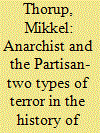

|
|
|
|
|
| Publication |
2008.
|
| Summary/Abstract |
This article deals with the anarchist and the partisan as forerunners of contemporary terrorism. It investigates their different relationship to the state, the anarchist trying to replace it and the partisan trying to conquer it and what that means in terms of resistance, critique, and position on the use of force. The article is both theoretical and historical, trying to place the anarchist and the partisan within their different time epochs and institutional settings. It ends by discussing if and how a third type of political violence, Islamist terrorism, can be interpreted within the analytical framework of legality/illegality and regularity/irregularity worked out in the article, that is, to what extent is current the Islamist terrorist a child of the anarchist and the partisan
|
|
|
|
|
|
|
|
|
|
|
|
|
|
|
|
| 2 |
ID:
131647
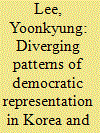

|
|
|
|
|
| Publication |
2014.
|
| Summary/Abstract |
This paper explains the difference between Korea's vocal movements and feeble parties versus Taiwan's stable parties and dependent movements from the political dynamics formed under the authoritarian state. Taiwan's party-based authoritarianism provided ground for party development but not for independent social movements. Korea's personal dictatorship was inimical to party development but engendered a contentious movement sector.
|
|
|
|
|
|
|
|
|
|
|
|
|
|
|
|
| 3 |
ID:
154378


|
|
|
|
|
| Summary/Abstract |
This article aims to chronicle and analyse the transformation of the army of the Ethiopian People’s Revolutionary Democratic Front (EPRDF) into a national army following its military and political triumph in 1991. The history of a modern army in Ethiopia is recent, beginning with the end of the Second World War. Since then, the Ethiopian army has gone through major changes under different regimes. However, it is only the latest version of the national army that has a properly organised military doctrine and strategy. Prior to this, the army’s concept of operations was shaped by the doctrines and strategies of its foreign sponsors. The organisation of the imperial army was influenced by the doctrine and strategy of Western armies (initially the British and later the Americans); the army’s concept of operations during the military regime was shaped by Soviet senior military advisors. The EPRDF army was an insurgent army that developed into a conventional army with its own set of military and military–political institutions, including its own military doctrine and its own concept of the science and art of war. The transition of the EPRDF army into a national army is a unique example of restructuring a people’s army into a national military, something rarely if ever attempted with this kind of comprehensiveness.
|
|
|
|
|
|
|
|
|
|
|
|
|
|
|
|
| 4 |
ID:
085112


|
|
|
|
|
| Publication |
2008.
|
| Summary/Abstract |
Richard M. Skinner challenges notions that the strong presidency of the modern era has proved incompatible with powerful political parties. Instead, he argues that, since 1980, the United States has seen a dramatic growth in presidential partisanship across a range of areas.
|
|
|
|
|
|
|
|
|
|
|
|
|
|
|
|
| 5 |
ID:
083115


|
|
|
|
|
| Publication |
2008.
|
| Summary/Abstract |
The author argues that to understand the relationship between partisan government and equality two fundamental things need to be done: separate the effects of partisanship on policy and of policy on the economy; and assess the influence of government partisanship once the mediating role of corporatism is accounted for. The main goal of this article is to explore the relationship between government partisanship, policy, and inequality at the lower half of the wage distribution. The analysis is motivated by a puzzling finding in previous work: the absence of government partisanship effects on earnings inequality. The author focuses on the role of three different policies: government employment, the generosity of the welfare state, and minimum wages. The results show that government employment is a most significant determinant of inequality (although it is affected by left government only when corporatism is low). They also demonstrate that welfare state generosity does not affect inequality and, in turn, is not associated with left government. Finally, they reveal that the effect of government partisanship on minimum wages and of minimum wages on inequality is completely conditional on the levels of corporatism (these effects are only present when corporatism is low). The author explains why specific policies do or do not affect earnings inequality and also why corporatism mitigates or magnifies the influence of government partisanship. By explicitly exploring the determinants of policy and earnings inequality, the article represents an important contribution to our understanding of how governments can promote redistribution
|
|
|
|
|
|
|
|
|
|
|
|
|
|
|
|
| 6 |
ID:
158142
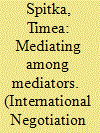

|
|
|
|
|
| Summary/Abstract |
The conditions under which multilateral international intervention are effective in ending a violent conflict is a critical question for scholars and practitioners. Scholarly studies have demonstrated the importance of a united intervention but have been in disagreement over the effectiveness of neutral versus partisan intervention. This article examines the conditions under which mediators construct a consensus on the type of intervention process. What are the factors that enable a consensus on a neutral versus a partisan intervention? Distinguishing between four types of international intervention processes – united-neutral, united-partisan, divided-partisan, and divided neutral and partisan intervention – this article argues that it is a united intervention, whether united partisan or united-neutral, that contributes to creating leverage on conflicting parties to end a conflict. The article examines consensus building among mediators within two divergent case studies: Northern Ireland and Bosnia and Herzegovina.
|
|
|
|
|
|
|
|
|
|
|
|
|
|
|
|
| 7 |
ID:
102072
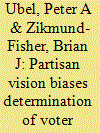

|
|
|
| 8 |
ID:
096157
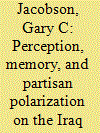

|
|
|
|
|
| Publication |
2010.
|
| Summary/Abstract |
Analyzes four surveys designed to investigate partisan polarization on the Iraq war. He finds that modes of motivated reasoning, including motivated skepticism and selective perception, selective memory, and selective exposure, contributed strongly to the emergence of the unusually wide differences of opinion on the war.
|
|
|
|
|
|
|
|
|
|
|
|
|
|
|
|